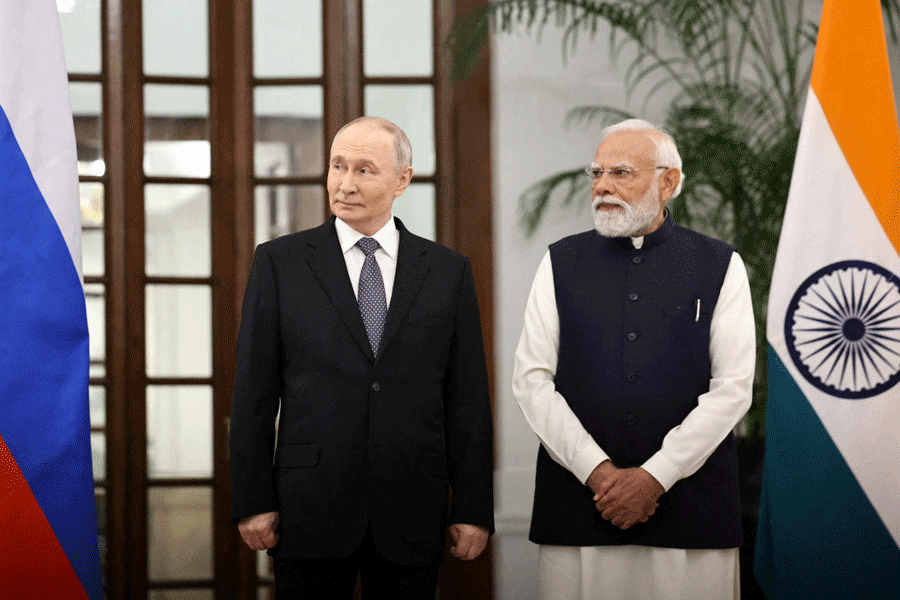Unmatched comfort
Sir — It would be a dream if one was paid to sleep. This is exactly the job that a man in Bengaluru has landed. He is the model for a company that makes mattresses and is paid to sleep on a bed in a moving vehicle across the city. While people are green with envy at the prospect of being paid to sleep, one wonders what kind of sleep the man is actually getting on that mattress. Modern-day foam mattresses — some of them are even recommended by orthopaedics — invariably leave people with a sinking feeling when sleeping at night. Nothing can beat the deep sleep that can be had on a good-old toshok which has been sunned during the day on a wooden bed. Add a pashbalish to the mix and all one’s worries are bound to fade away into the comfort of the mattress.
Pablo Sanyal, Calcutta
In need of aid
Sir — The recent earthquake in Myanmar has intensified the suffering of a population already battered by the military junta’s rule and ongoing conflict (“Temblor toll crosses 1,600”, Mar 30). With at least 1,644 confirmed deaths and many more feared, the humanitarian crisis is deepening. The junta’s tight control over information, combined with the extensive destruction, leaves the international community with limited visibility into the full scale of the disaster. Aid efforts are hindered by the division between territories controlled by the junta and resistance groups, such as the People’s Defence Force. It is crucial that humanitarian organisations have unimpeded access to affected areas, regardless of the governing authorities, to ensure life-saving aid reaches those in need.
Amit Basu, Calcutta
Sir — The devastating earthquake in Myanmar compounds the already severe humanitarian crisis in that country. With many people already displaced or facing hunger, the military junta’s repression and control over aid distribution exacerbate the crisis. While international assistance is vital, navigating the fractured political landscapewill be challenging. The junta should not use this disaster to tighten its gripon power.
Devendra Khurana, Bhopal
Sir — Myanmar’s ongoing suffering from the devastating earthquake is worsened by the junta’s continued military actions, even amid the crisis. With more than 1,600 lives lost and aftershocks still shaking the region, international aid is desperately needed. Countries like India, China, and the United Kingdom have stepped up with relief efforts, but the logistical challenges and military interference are significant barriers. Medical supplies and search teams are urgently required to save lives. The international community must work together to ensure aid reaches those most in need.
Shyamal Thakur, East Burdwan
Sir — The earthquake in Myanmar has caused widespread devastation. Relief efforts are struggling due to damaged infrastructure and a severe shortage of medical supplies. Hospitals are overwhelmed, and rescue teams are working tirelessly to find survivors. As aid continues to arrive, it is essential that it reaches the most affected areas promptly, including those in remote and hard-to-reach regions.
Anupam Neogi, Calcutta
Multiple tongues
Sir — The ongoing debate surrounding the three-language policy in India, particularly in the context of the National Education Policy, highlights the deep-rooted linguistic divides across states (“Beyond politics”, Mar 29). The NEP’s attempt to offer flexibility in the choice of the third language is commendable, yet the apprehensions of states like Tamil Nadu and Kerala are valid. The rise in the number of Hindi speakers has been at the expense of languages such as Tamil and Bengali, which is a concern for many. The key issue, however, is not the language chosen but its practicality and relevance. The third language should be useful to students, not dictated by ideological preferences. Moreover, the policy should also encourage linguistic diversity in the Hindi belt, which often remains resistant to multilingualism. Language education must be based on local realities and needs, not political considerations.
Vartika Singh, Patna
Sir — The debate surrounding India’s language policy is far more complex than simply imposing Hindi in southern states. While the NEP 2020 aims to diversify linguistic choices, the concern in states like Tamil Nadu about the rise of Hindi speakers at the cost of regional languages is understandable. However, language policy should be about practicality. Teaching Tamil in Uttar Pradesh serves little purpose, just as Sanskrit might not be relevant in southern states. The focus should be on languages that are genuinely useful, and there must be equal representation for non-Hindi states in the Hindi belt as well. The policy must be adaptable to India’s dynamic social shifts.
S.K. Choudhury, Bengaluru
Indisputably great
Sir — James Baldwin’s reflection on his relationship with the English language serves as a profound lens through which we can examine the current debate around ‘decolonising’ William Shakespeare (“Tempest in a teacup”, Mar 30). Baldwin’s journey of reclaiming a language that once represented oppression underscores a broader tension: can we decolonise a language or literary tradition without losing the possibility of resistance and self-expression?
Jahar Saha, Calcutta
Sir — The debate about decolonising Shakespeare raises important questions, but it often overlooks the transformative power his works have had globally. Shakespeare’s greatness lies in his ability to complicate battles and transcend labels.
Indranil Sanyal, Calcutta










